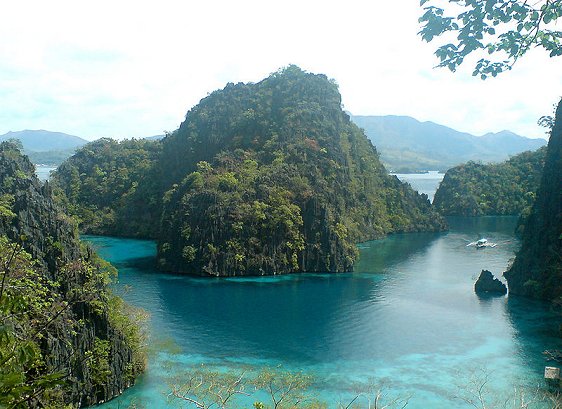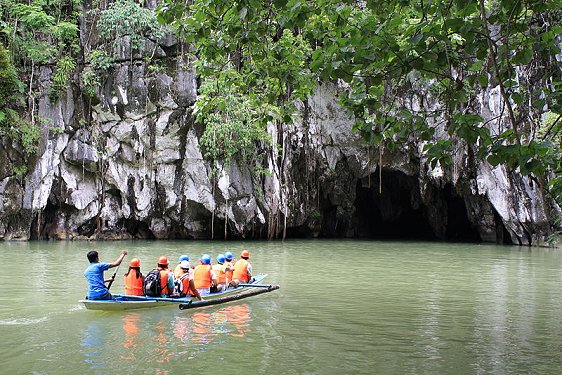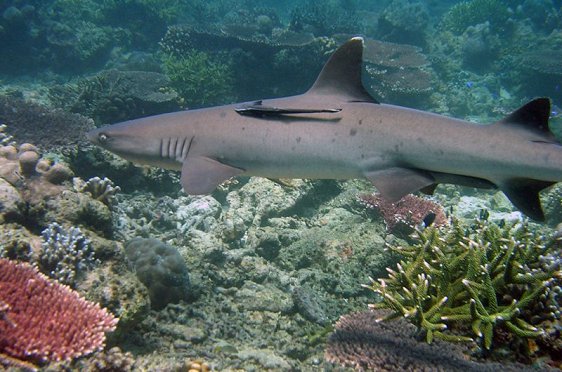 Stilt village along the coast of Palawan, Philippines
Stilt village along the coast of Palawan, Philippines http://commons.wikimedia.org/wiki/File:Palawan_-_Haven.jpg
http://commons.wikimedia.org/wiki/File:Palawan_-_Haven.jpg Torox
Torox
Palawan is the name of the island as well as the administrative province in southwestern Philippines. It is the largest province in the country. The main island of Palawan is a long but narrow island, measuring 450 kilometers (280 mi) from end to end and with a width of 50 km (31 mi) at the most. It has a jagged coastline dotted with coves and sea caves.
Palawan is sparsely populated compared to the other main islands of the Philippines. The island is still densely forested. The highest peak is Mount Mantalingahan, which is 2,086 m (6,843 ft). In addition to the main island, the province of Palawan also include the Calamianes group of islands.
 Seaside in Palawan
Seaside in Palawan http://commons.wikimedia.org/wiki/File:Palawan_-_Tropical_Hut.jpg
http://commons.wikimedia.org/wiki/File:Palawan_-_Tropical_Hut.jpg Torox
Torox
Human habitan on Palawan Island goes back 22,000 years ago, as evidenced by the discovery of the remains of Tabon Man in 1962. It is the second oldest human remains to be found in the Philippines after that of the Callao Man, in Cagayan, in 2007, which is 67,000 years old.
In the pre-colonial times, Palawan was inhabited by various native tribes that migrated within the Malay archipelago. Chinese traders also visited the island as early as AD 982. Settlers of Malay stock arrived in the 12th century, establishing Malay chiefdoms. In the 13th century the Majapahit Empire extended its influence over the area, introducing Buddhism and Hinduism which however did not make a lasting impact on the population.
 Coron Island cove, Palawan
Coron Island cove, Palawan http://commons.wikimedia.org/wiki/File:POTW_MichelleELLA01.jpg
http://commons.wikimedia.org/wiki/File:POTW_MichelleELLA01.jpg IRRI Images
IRRI Images
The first Europeans to arrive in Palawan are believed to the the remaining crew of Ferdinand Magellan's voyage, after Magellan was killed in a fight in Cebu. One of the survivors, Antonio Pigafetta, who was Magellan's chronicler, called Palawan the Land of Promise because they found food there which saved them from starvation.
Spanish colonialization of Palawan began from north down, beginning with the Calamianes Islands. In the 17th century, Catholic missions were dispatched to various settlements in Palawan. In 1749 thewhole island was ceded by the Sultanate of Borneo to Spain.
 Approaching Puerto Princesa Subterranean River
Approaching Puerto Princesa Subterranean River http://en.wikipedia.org/wiki/File:Puerto_Princesa_Underground_River.jpg
http://en.wikipedia.org/wiki/File:Puerto_Princesa_Underground_River.jpg Mike Gonzalez
Mike Gonzalez
Main cities and municipalities of Palawan
- Puerto Princesa
Provincial capital of Palawan and its only city. It is also the second largest city in the Philippines, after Davao City, in area. - Brooke's Point
Town named after Sir James Brooke, the White Rajah of Sarawak, where the biggest pearl in the world was found. - Busuanga
Town on Busuanga Island, of the Calamian Group of Islands. - Coron
Town on Coron Island, part of the Calamian Group of Islands, popular as a diving location. - El Nido
Town on the northern tip of Palawan, famous for its limestone cliffs, lagoons and beautiful beaches.
 Shark at Tubbataha Reef, Palawan, Philippines
Shark at Tubbataha Reef, Palawan, Philippines http://en.wikipedia.org/wiki/File:Tubbataha_Shark.jpg
http://en.wikipedia.org/wiki/File:Tubbataha_Shark.jpg Simon Hefti
Simon Hefti
Places of Interest in Palawan
- San Vicente
Town in northwestern Palawan with the longest beach in the world. - Tubbataha Reef
Protected atoll coral reef in the Sulu Sea.
World Heritage Site in Palawan
- Puerto Princesa Subterranean River National Park
A nature site located some 50 km to the north of Puerto Princesa.
 Latest updates on Penang Travel Tips
Latest updates on Penang Travel Tips
 Map of Roads in Penang
Map of Roads in Penang
Looking for information on Penang? Use this Map of Roads in Penang to zoom in on information about Penang, brought to you road by road.
Copyright © 2003-2025 Timothy Tye. All Rights Reserved.

 Go Back
Go Back